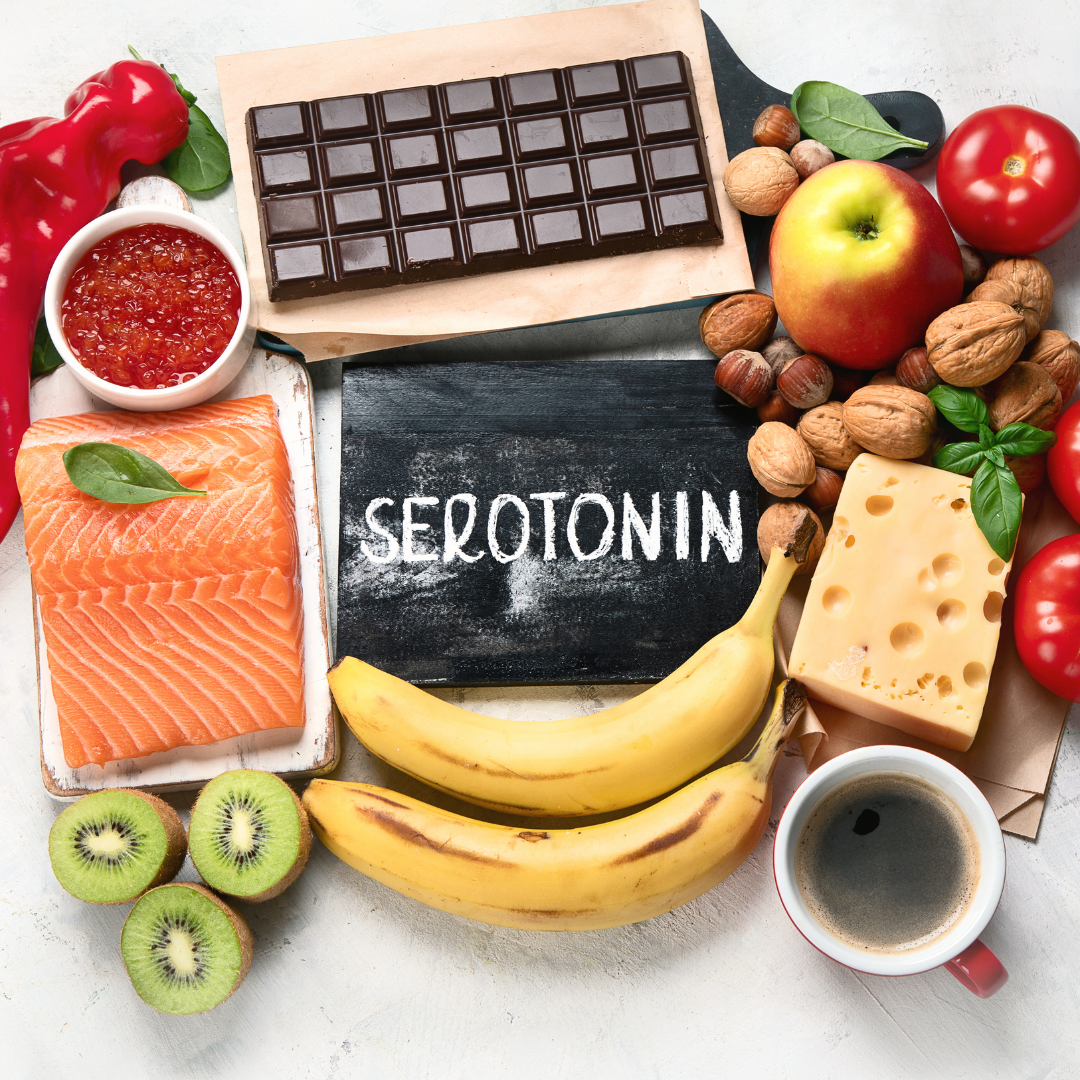Serotonin and Food
Our moods are regulated by the neurotransmitter serotonin, which is located in the brain. Serotonin deficiency can cause sadness, anxiety, and other mental health problems. Although it has long been believed that food contributes to the production of serotonin, research has revealed that not all foods have a same impact on our serotonin levels. One sort of food that can raise our serotonin levels is carbohydrates. Oatmeal and popcorn are examples of complex carbohydrates that can stimulate serotonin synthesis by up to 20%. Also, since tryptophan is required to make more of this hormone in the body, foods high in this amino acid, such as poultry, nuts, and eggs, can also help raise serotonin levels. Dark chocolate and green tea, which contain substances known to raise dopamine levels, are further food options for elevating your sensation of happiness. Finally, probiotics, which are present in yoghurt, have recently been discovered to influence the release of both dopamine and serotonin.
Describe serotonin
The neurotransmitter serotonin is located in the brain and is responsible for controlling a variety of physiological functions, including mood, sleep, and emotions. It has earned the moniker “happy hormone” due to its capacity to improve our wellbeing by altering how we perceive happiness. Tryptophan, an amino acid present in a variety of foods including turkey, eggs, and nuts, is ultimately used by the brain to make serotonin. When carbs are turned into glucose, which aids in the brain’s manufacture of serotonin, eating foods high in carbohydrates also helps to raise serotonin levels. In a similar way to a drug but without the negative side effects, eating these kinds of foods can increase our levels of serotonin, which can enhance our view on life by making us feel more positive and calm. Moreover, exercise raises serotonin levels because it improves blood circulation throughout the body by increasing the oxygen exchange between muscles and blood.
Increasing Serotonin Levels With Eating
Foods High in Tryptophan: Tryptophan is an amino acid that aids in the brain’s production of serotonin. Tryptophan-rich foods, such as turkey, fish, beans, nuts and seeds, oats, and eggs, can raise serotonin levels in the brain. By speeding up the absorption of tryptophan into the bloodstream, eating these foods with a carbohydrate can also aid to increase levels of this amino acid.
High-Fiber Foods: Consuming a lot of high-fiber fruits and vegetables can also aid in boosting the brain’s ability to produce serotonin. Fruits and vegetables including leafy greens, cruciferous vegetables like broccoli and Brussels sprouts, legumes like kidney beans or black beans, nuts, and whole grains like quinoa or brown rice are among them. Also included are apples, oranges, bananas, raisins, dates, and other dried fruits.
Healthy Fats: Because they supply the precursors to this neurotransmitter, healthy fats are necessary for normal serotonin synthesis. Olive oil, avocado oil, fatty fish (like salmon), walnuts, and flaxseeds are a few examples of good fats.
Advantages of Increased Serotonin
A hormone called serotonin boosts emotions of happiness and well-being in the body. The body produces it naturally, but it can also be enhanced by eating particular foods. Serotonin-rich meals can provide a number of advantages. Secondly, consuming foods high in serotonin lowers stress and anxiety levels. This is due to the calming effects of serotonin, which promote relaxation of the body and mind and lower levels of stress chemicals like cortisol. Increased serotonin levels may also improve focus and alertness, which can make it simpler to stay productive throughout the day. Second, a higher serotonin level may aid in memory recall and speed up the process of learning new abilities. Also, having adequate serotonin in your system helps enhance mood stability and lessen depressive or other mental disorder symptoms like exhaustion or apathy. Finally, it might even assist in controlling hunger by lowering your propensity to go for unhealthy snacks during times of stress or anxiety.
Serotonin and Exercise
Exercise can release the neurotransmitter serotonin, which is linked to happiness. Exercise causes our bodies to release endorphins, which improve mood and cause “runner’s high,” a state of happiness. The endorphin release improves mental focus and clarity, which can help lessen the symptoms of stress, anxiety, and depression. It also raises serotonin levels in the brain. Frequent exercise has also been related to better sleep patterns because it relaxes muscles, which makes it simpler for us to fall asleep at night. When hormones like cortisol (the stress hormone) are in balance, exercise also helps regulate them, which improves our ability to control our emotions. By giving anger and other unpleasant emotions a somewhere to go, exercise can also boost self-esteem. Exercise is essential for maintaining general mental health and raising serotonin levels due to a combination of all these variables. In addition to releasing serotonin, exercise also offers opportunities for social connection, which further promotes pleasant moods because people are social animals that thrive on exchanging experiences with others.
Dietary Supplements to Increase Serotonin
In order to increase their levels of serotonin, which is produced by the body from the amino acid tryptophan, many people are turning to dietary supplements. Some foods, including walnuts, turkey, eggs, dairy products, and leafy greens, contain tryptophan. However, you might want to think about supplementing your diet with extra vitamins and minerals if it doesn’t contain enough tryptophan or other serotonin-boosting elements like Vitamin B6 or magnesium oxide. Omega-3 fatty acids have also been discovered to raise serotonin levels through facilitating the brain’s more effective conversion of tryptophan to serotonin. St. John’s wort extract, saffron extract, and 5-HTP (5 hydroxytryptophan) are other supplements for elevating serotonin. Serotonin is a naturally occurring neurotransmitter that can help elevate mood and lessen stress. 5-HTP works by enhancing the production of these neurotransmitters. Due to its inherent antidepressant characteristics, St. John’s Wort has been used for millennia to treat depression, while saffron extract has long been utilised as an anxiolytic due to its fast relief of anxiety symptoms.
Best Dietician’s Opinion about Serotonin
The top dietician, Dr. Pankaj Kumar, asserts that serotonin levels are significantly influenced by food. Serotonin levels can be kept stable by eating a balanced diet and avoiding processed foods. The amount of serotonin produced in the brain can be increased by eating complete grains, proteins, fruits, and vegetables. In order to maximise serotonin levels, he also recommends including meals high in omega-3 fatty acids including fish, almonds, and flaxseeds. It’s also advised to consume adequate vitamin B6, which aids in the conversion of tryptophan into serotonin. Last but not least, eating consistently throughout the day is essential for preserving appropriate serotonin levels because skipping or delaying meals may throw off the body’s hormonal equilibrium.
Conclusion
Serotonin levels can be raised in large part by making healthy food choices. To boost the production of serotonin, tryptophan, an important amino acid, should be consumed in foods. Tryptophan is found in foods like eggs, nuts and seeds, dairy products, turkey, fish, and soy products. A balanced diet that includes lots of veggies, lean protein, and healthy fats is also essential. Serotonin levels are significantly regulated by exposure to light. Both short-term and long-term investigations lasting up to a year or longer have shown that serotonin levels are dramatically raised by exposure to strong natural light. By increasing the synthesis of feel-good hormones like serotonin, spending time outside during the day is quite excellent for supporting wellness.
The production of endorphins, a different sort of “happy hormone” that helps regulate emotion and fosters wellbeing, has been demonstrated to be one of the most effective strategies to improve mood. Exercise doesn’t have to involve strenuous physical activity; merely going for regular walks in nature can have positive effects on one’s physical and mental wellbeing.




